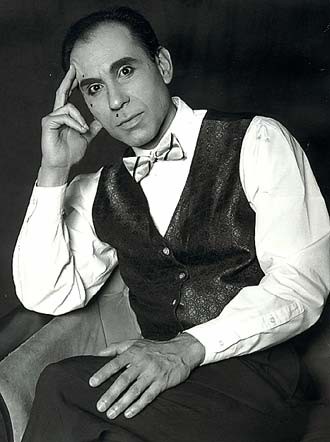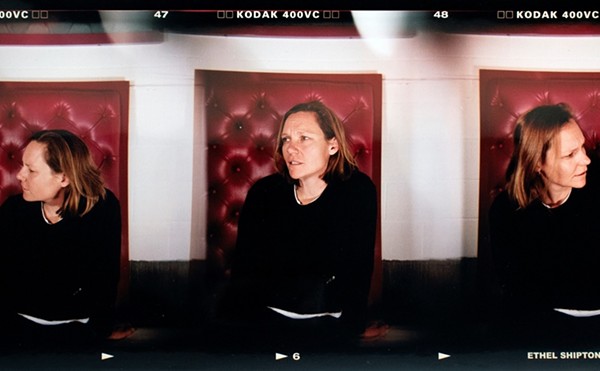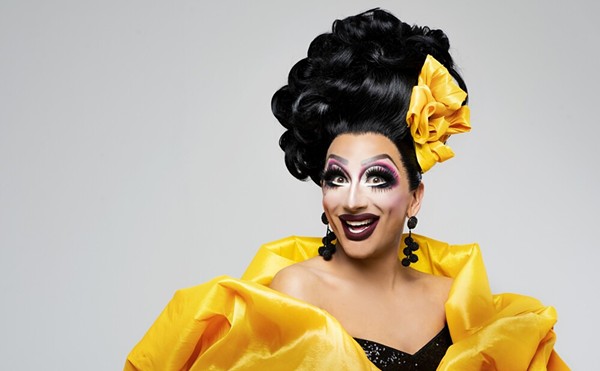| José Rubén De Léon (courtesy photo) |
"I was auditioning for a play at Incarnate Word College, and when I was on the stage, my Spanish accent came out. I pronounced the word 'bean' instead of 'been.' And my fellow students laughed, and the director was folded over her chair. It was the most humiliating moment of my theatrical career."
A few days later, José Rubén De León picked up a book on Spanish poet and dramatist Federico García Lorca at Half Price Books. He had been an admirer since assisting on a production of Lorca's The House of Bernarda Alba. He decided he would write a one-man show about Lorca, become a solo performer, and never have to audition again.
Instead, De León's solo career began with a performance of the Gospel of Mark in 1992, followed by a one-man musical he wrote about the life of St. Francis. De León started his own business, recorded a collection of original bilingual love songs, On Borrowed Time, and a traditional Indian chant, "Bengali Lullaby." He wrote and performed a third one-man show, El Encuentro/The Encounter: Juan Diego and the Virgen de Guadalupe, which toured throughout the United States and Ireland. But his original inspiration continued to haunt him.
"Finally, on May 18, 2002, on the night of my birthday, I pulled out all my research material and started the writing process," De León explains. "The entire year of writing has been affected by the images of collapsing towers in New York and the images of men, women, and children mourning the loss of a loved one. And then there were the images of the bombings of Afghanistan and Iraq, and the countless images of suicide bombings and of women and children caught in the whirlwinds of terror and pain. All of this was of great value to me as an actor and a playwright because I was able to get a sense of the terror that surrounded García Lorca the weeks before his arrest."
Lorca, perhaps best known for the three "folk tragedies" - Blood Wedding, Yerma, and The House of Bernarda Alba - was born in 1898 near Granada, Spain. He is associated with a group of artists who became known as Generación del 27, including painter Salvador Dalí, filmmaker Luis Buñuel, and poet Rafael Alberti. Intellectuals were considered dangerous by General Franco's Nationalists, and in the early morning of August 19, 1936, soldiers dragged Lorca into a field at the foot of the Sierra Nevada Mountains, shot him, and threw him into an unmarked grave. His writings were outlawed and burned in Granada's Plaza del Carmen. He became a martyr, an international symbol of the politically oppressed, but his plays were not revived until the 1940s, and some bans on his work remained as late as 1971.
| FEDERICO GARCÍA LORCA FESTIVAL Lorca Poetry Recital 7pm Thursday, October 23 Free Little Carver Civic Center 226 N. Hackberry 207-2234 LORCA 8pm Friday, October 24 Saturday, October 25 $15 Little Carver Civic Center |
While he acknowledges the resonance of Lorca's story in our current political and cultural climate, De León hopes that the piece's influence will be larger and more literary. "This is not a political theatrical piece, but the political background helps me illustrate the senseless assassination of a literary giant who dared to be an advocate of liberty and social justice," he says. "Many of us are familiar with hate crimes. We have heard of people being tied to a vehicle and dragged because they were black. We have heard about Matthew Shepard, who was beaten to death because he was a homosexual. Lorca's death, in my opinion, was a hate crime. He was killed because he was an intellectual, a creative writer, a left-wing supporter, and a homosexual. And in a totalitarian society, all of these were marks against him. I hope to turn others to Lorca's passionate body of work. There are several generations of actors, for example, that have gone through a theater program without ever being introduced to Lorca's comedies and tragedies. There are many young writers today who don't know who Lorca was." •
















